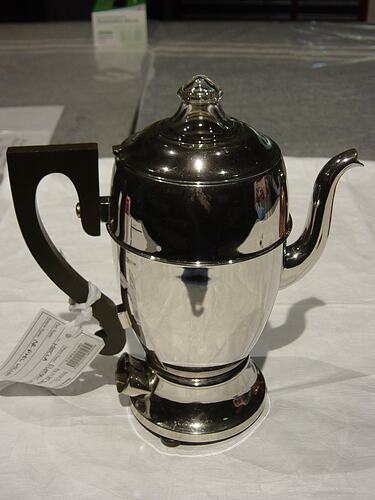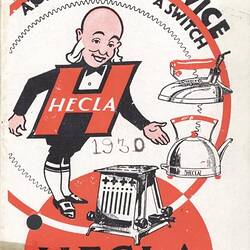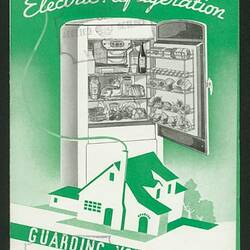Summary
Alternative name - Electric Coffee Pot
Stainless steel electric coffee percolator with bakelite handle and glass dome lid, made by Hecla Electrics Pty Ltd, Melbourne, Australia, about 1934. Hecla Electrics made a range of similar coffee percolators between the 1920s and 1960s.
The Hecla brand name and logo was registered in 1918 by Clarence Marriott. It was inspired by the recent eruption of Iceland's volcano Mt Heckla. Clarence and his father James were metal workers who had made Australia's first carbon filament electric radiators in 1899, and also built an early steam car.
As electricity use exploded in the 1920s and 1930s, 'Hecla' became a household name in Melbourne. They made a wide range of appliances for the home, and supplied commercial appliances to cafés, hospitals and offices. In 1927, the company shifted from small premises in the city to a bigger, electric-powered factory in South Yarra.
Hecla had no retail stores of its own - instead it sold products through wholesalers and retailers, including the State Electricity Commission (SEC). The company promoted its goods through advertisements in home magazines and displays in shop windows, home shows and the 1935 All-Electricity Exhibition. A popular advertising slogan in the 1930s was 'Hecla household helps make happy healthy housewives!'.
Hecla ceased manufacturing in Melbourne in the 1980s.
Physical Description
Coffee pot made of stainless steel. Has a black bakelite handle and is designed to accept a standard flat 2-pin 240 Volt AC electric power cord. Has a clear glass dome or inverted cup fitted to the centre of the lid.
Significance
Hecla Electrics Pty Ltd were a significant Melbourne manufacturing company, who became a household name in the 1920s making small electric appliances such as heaters and kettles. They also made a variety of other electrical appliances for domestic, commercial and military use. The company manufactured electric appliances in Melbourne from about 1922 until the 1980s, although Clarence Marriott, who formed the company, had begun making radiators with his father James in 1899. The company had a reputation for quality products. The company also played an important role within the Australian domestic and commercial appliance industry, both as a leading innovator and through its role in training skilled staff, many of whom went on to work for competitors such as Kambrook, Electrolux and Sunbeam.
This electric coffee percolator represents the typical small domestic appliance that the Hecla company was famous for. Along with other items in the Hecla Collection, it highlights the diversity of electric appliances that the company made. This object also highlights the legacy of high quality design and metal construction work that Clarence and James established for the company, stemming from their early work as talented art metal workers. It also represents the first major period of the take-up of electricity use in the home. This take-up began in the 1920s and 1930s with the use of small appliances, and by the 1950s electricity had become commonplace in the home, and large appliances such as refrigerators and stoves became standard.
More Information
-
Collection Names
-
Collecting Areas
-
Acquisition Information
Donation from Mr Phil Wollen, 22 Oct 2004
-
Manufacturer
Hecla Electrics Pty Ltd, 696 Chapel Street, South Yarra, Greater Melbourne, Victoria, Australia, 1934
-
Inscriptions
On base: HECLA/VOLTS WATTS/230-240 350/CAT. No./P2/SUBMITTED TO/ELECTRICAL APPROVALS BOARD/REFERENCE No. AU/AD/O1 "SECV"
-
Brand Names
-
Classification
Domestic life, Food & drink preparation, Appliances - coffee making
-
Category
-
Discipline
-
Type of item
-
Object Measurements
24.1 cm (Length), 10.8 cm (Width), 28.85 cm (Height)
-
Maximum dimensions
255 mm (Length), 130 mm (Width), 280 mm (Height)
Measurement From Conservation. Dimensions with lid in position.
-
References
Collection includes a significant amount of archival material.


